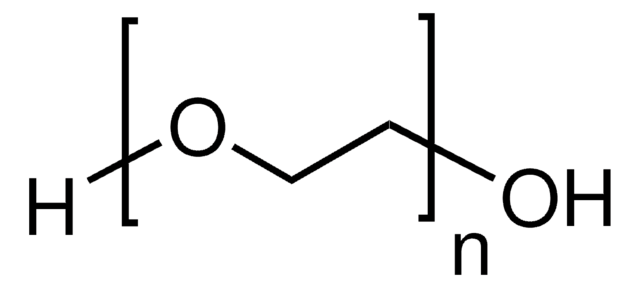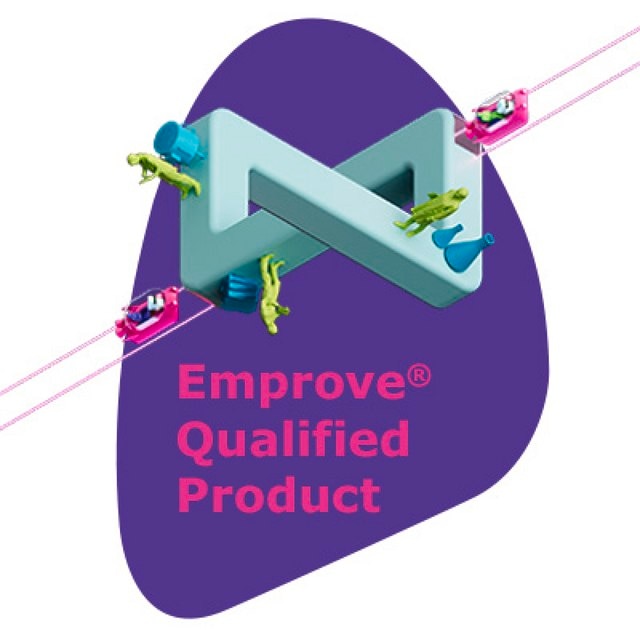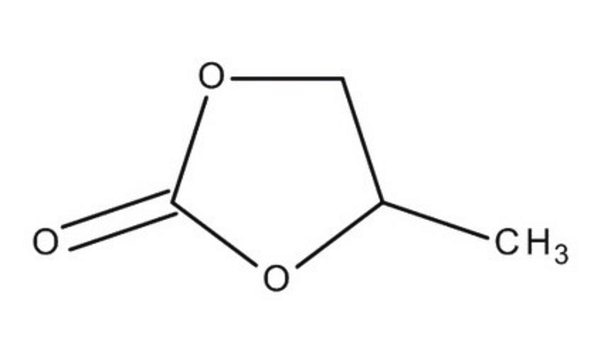PX1286B
Polyethylene glycol
400
Synonym(s):
Poly(ethylene glycol), PEG 400, Carbowax, Polyethylene Glycol 400, PEG
About This Item
Recommended Products
vapor pressure
<0.1 hPa ( 20 °C)
Quality Level
form
liquid
color
APHA: ≤18
pH
5-7 (20 °C, 100 g/L in H2O, neutral)
mp
5 °C
transition temp
flash point >200 °C
shipped in
ambient
storage temp.
room temp
SMILES string
C(CO)O
InChI
1S/C2H6O2/c3-1-2-4/h3-4H,1-2H2
InChI key
LYCAIKOWRPUZTN-UHFFFAOYSA-N
Application
- Flexible Hydrogelation for Tactile Sensing: Recent research highlights the application of polyethylene glycol in bioinspired flexible hydrogels with programmable properties, enhancing the capabilities for tactile sensing applications (Wang et al., 2024).
- Ocular Drug Delivery: Polyethylene glycol has been utilized in a sterilizable platform based on crosslinked xanthan gum for the controlled release of polymeric micelles, aimed at delivering neuroprotective compounds to the posterior eye segment (Signorini et al., 2024).
- Nanoscale Drug Delivery Systems: A study on the nanoscale evaluation of black phosphorus nanosheets functionalized with polyethylene glycol and drug-loaded gold nanoparticles emphasizes its potential in enhancing drug delivery system stability (Gunathilaka and Shimomura, 2024).
- Amphiphilic Thermogels for Biomedical Use: Polyethylene glycol is a key component in the design of carbosilane dendritic networks for developing high-swelling amphiphilic thermogels, suitable for various biomedical applications (Muñoz-Sánchez et al., 2024).
- Biomedical and Environmental Polymer Applications: The role of polyethylene glycol in synthesizing natural and synthetic polymers showcases its versatility in both biomedical and environmental applications, offering new opportunities for sustainable material development (Satchanska et al., 2024).
Analysis Note
Storage Class
10 - Combustible liquids
wgk_germany
WGK 1
flash_point_f
281.5 °F - closed cup
flash_point_c
138.6 °C - closed cup
Certificates of Analysis (COA)
Search for Certificates of Analysis (COA) by entering the products Lot/Batch Number. Lot and Batch Numbers can be found on a product’s label following the words ‘Lot’ or ‘Batch’.
Already Own This Product?
Find documentation for the products that you have recently purchased in the Document Library.
Customers Also Viewed
Our team of scientists has experience in all areas of research including Life Science, Material Science, Chemical Synthesis, Chromatography, Analytical and many others.
Contact Technical Service

